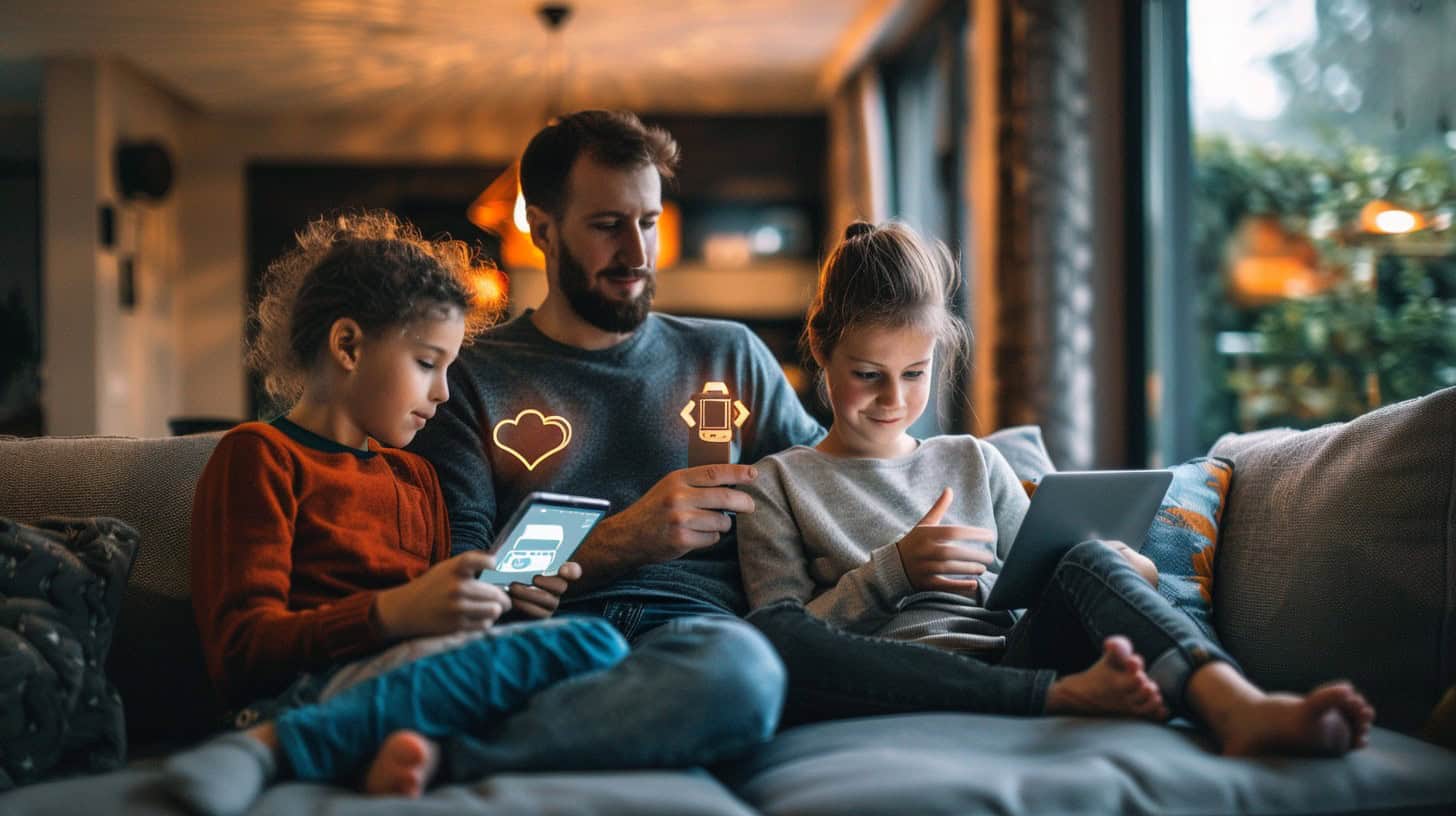Are you wondering if you can share your VPN with family? The truth is, many VPNs allow multiple device connections. This article will guide you through securely connecting various devices with a single VPN account.
Keep reading to find out how.
Key Takeaways
You can share a VPN with your family, allowing multiple devices to connect at once. For example, Surfshark allows unlimited device connections, while NordVPN lets you hook up to 10 gadgets.
When sharing a VPN, it’s important to pick one that supports different types of devices like iOS phones, Android tablets, and Windows PCs. This ensures all family members can use the VPN on their preferred devices.
The speed might slow down when many people use the VPN simultaneously. Choosing a VPN with lots of servers can help keep the internet fast for everyone.
Free VPNS like ProtonVPN and Windscribe offer security without cost, but may have limitations like data caps or fewer simultaneous connections compared to paid ones.
Setting up a VPN for family use involves choosing a service, subscribing, downloading apps on each device, and possibly adjusting settings like split tunneling or ad blocking for better performance.
Table of Contents
VPN Fundamentals
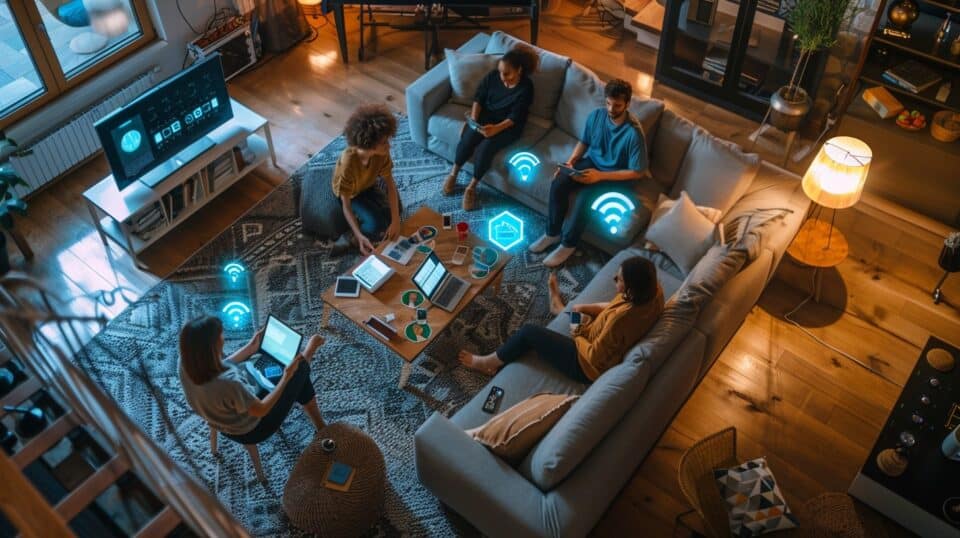
A VPN is like a secret tunnel for your internet journey. It keeps your online trips safe from prying eyes, making top VPN services key for privacy.
Defining VPN
A VPN, short for Virtual Private Network, creates a secure tunnel between your device and the internet. It hides your online actions by encrypting your data. This makes it hard for others to track you and keeps your information safe from hackers.
VPNs also help you access websites that are blocked in some places.
Using a VPN, you can change your location to anywhere in the world. This lets you watch shows or visit websites that aren’t available in your country. Think of it like having a secret passageway on the web that keeps you safe and opens doors to new content.
The Importance of VPNs
VPNs stand for Virtual Private Networks. They give us online freedom and keep our internet use safe. You can watch shows from anywhere, stay hidden online, and avoid prying eyes. With a VPN, your data travels through secure tunnels.
This way, hackers can’t grab it.
I used a VPN to watch sports not shown in my country. The experience was great—no buffering or delays. But more than that, I felt safe doing banking on public Wi-Fi. Cybersecurity experts at Cybernews agree—VPNs protect against cyber threats like malware and spying attempts by creating encrypted connections between your device and the internet.
The Possibility of VPN Sharing
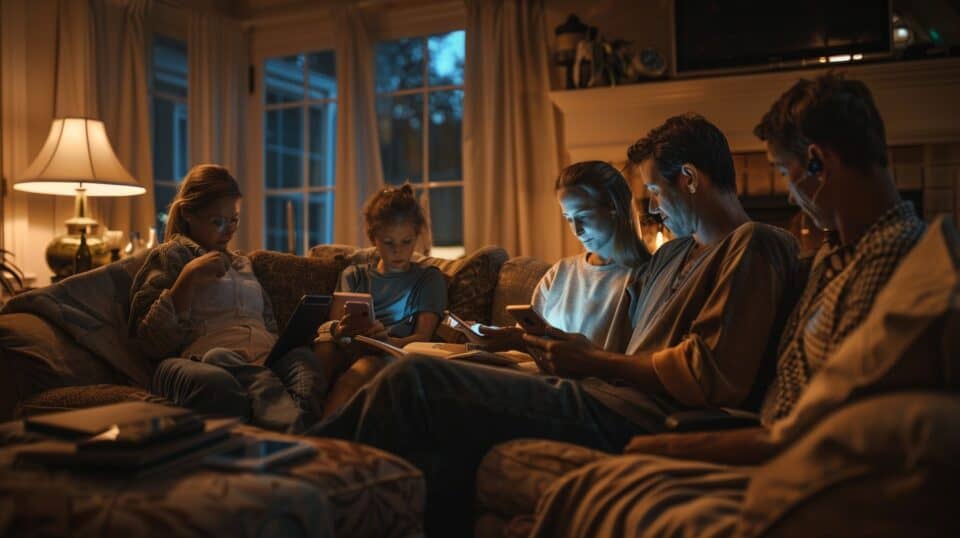
Yes, you can share your VPN with family. This lets everyone stay safe online, no matter where they are or what device they use.
Sharing Your VPN with Family Members
You can share your VPN with family members, allowing them to enjoy the same online security and privacy. Surfshark allows for unlimited device connections, so everyone in the house can connect at once without issues.
Most VPNs let you connect at least five devices simultaneously. This means phones, tablets, laptops, and more can all use the same VPN account.
Make sure your VPN supports different types of devices. Your family may use a mix of iOS phones, Android tablets, Windows PCs, and smart TVs. A good family-friendly VPN works well across these platforms.
This way, no matter what device they choose to use, they’re protected. You also want to manage who uses the VPN to keep things fast for everyone. With a proper setup, multiple people streaming movies or music won’t slow down the internet for others in the household.
VPN Use Across Multiple Households
With a VPN, families living in different homes can share one account. I’ve done this with NordVPN and CyberGhost. Both allow multiple devices at once. This means everyone stays safe online, no matter where they are.
Some VPNs let you connect over ten gadgets at the same time. For big families, this is perfect. Everyone from grandparents to kids can use it on their own devices—phones, laptops, smart TVs.
It’s like having a secure internet bubble around each device.
Device Limitations with VPNs
A VPN lets you connect many devices. But, there’s a limit. Take NordVPN; it allows up to 10 devices at once. Surfshark goes further, offering connections for as many gadgets as you want.
This sounds great until your family tries to hook up every phone, tablet, and laptop at home.
My experience showed these limits in real life. Connecting multiple devices slows down the speed. For example, streaming movies on three tablets while someone else makes video calls can lead to buffering or dropped calls.
To manage this, we learned to prioritize who needs the VPN more urgently during peak hours.
Every device adds weight to your VPN connection; balance is key.
Key Factors in VPN Sharing
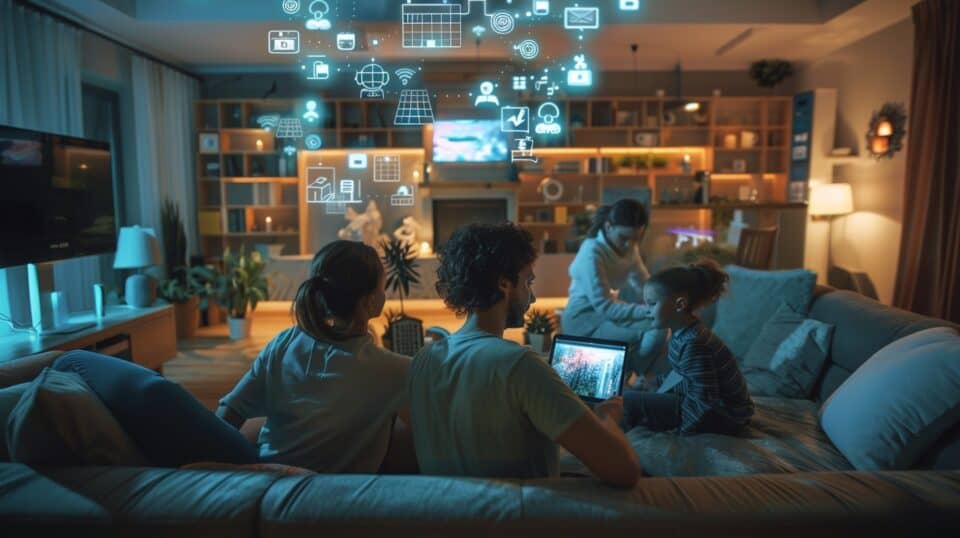
When sharing a VPN, look out for how many devices can connect at once and if it works on all your gadgets. Keeping your info safe and internet speed fast matters too, even when lots of people use the VPN together.
Simultaneous Connection Limits
Many VPNs set a cap on how many devices you can connect at once. This number varies, so it’s key to know the limits before sharing with your family. For instance, NordVPN, Norton VPN, and PureVPN allow connections on up to 10 devices simultaneously.
Surfshark and IPVanish go a step further by offering connections for an unlimited number of devices. On the other hand, ExpressVPN caps at 8 devices, while CyberGhost permits up to 7.
These restrictions mean planning is essential when deciding how and when family members use the VPN. My experience shows that keeping track of who connects and from what device helps avoid hitting these limits unexpectedly.
Next up is ensuring compatible platforms across all users’ gadgets.
Ensuring Compatibility Across Platforms
After looking at connection limits, it’s time to talk about making sure your VPN works well with different gadgets and systems. NordVPN, Surfshark, Norton VPN, ExpressVPN, and CyberGhost make sure your devices are ready to connect, no matter what they run on—Windows, macOS, or even Linux.
These services have apps for phones, computers, smart TVs like those running tvOS or Android TV, and other internet-capable gear.
Setting up a router with a VPN lets you cover all the tech in your house without worrying about device numbers. This means everything from smartphones to Roku TVs can enjoy safe internet use under one network.
It makes using devices easier because you don’t need separate VPNs for each one. Just choose a service that supports many operating systems and install it on your router for wide coverage.
Maintaining Privacy
Keeping your internet use secret is key. A good VPN has tools like AES 256-bit encryption and a no-logs policy. These things make sure no one can see what you do online. I once had trouble with hackers; they got into my email because I wasn’t careful about privacy.
That taught me to always use a VPN with DNS leak protection and a kill switch. This way, even if the connection drops, my info stays safe.
Privacy means keeping out unwanted eyes—yours, mine, everyone’s. Make sure every device in your family uses these protections too. It’s not hard to set this up on phones, tablets, and computers at home.
With the right VPN, all our devices stay hidden on the web.
A secure internet starts with strong privacy tools.
Managing Speed for Multiple Users
Sharing a VPN service among several users can slow down internet speed. It’s like a highway–more cars mean more traffic jams. A VPN with quality of service features helps manage this by prioritizing web activities that need fast speeds, such as video calls and streaming.
Some VPNs offer split-tunneling, allowing less important tasks to bypass the VPN to keep things running smoothly.
To ensure everyone enjoys good speed, pick a VPN that supports unlimited simultaneous connections and has plenty of servers. More servers reduce overcrowding and boost speed for all users on the network.
Next, we’ll explore recommended VPNs perfect for families who want to stay connected securely.
Recommended VPNs for Families
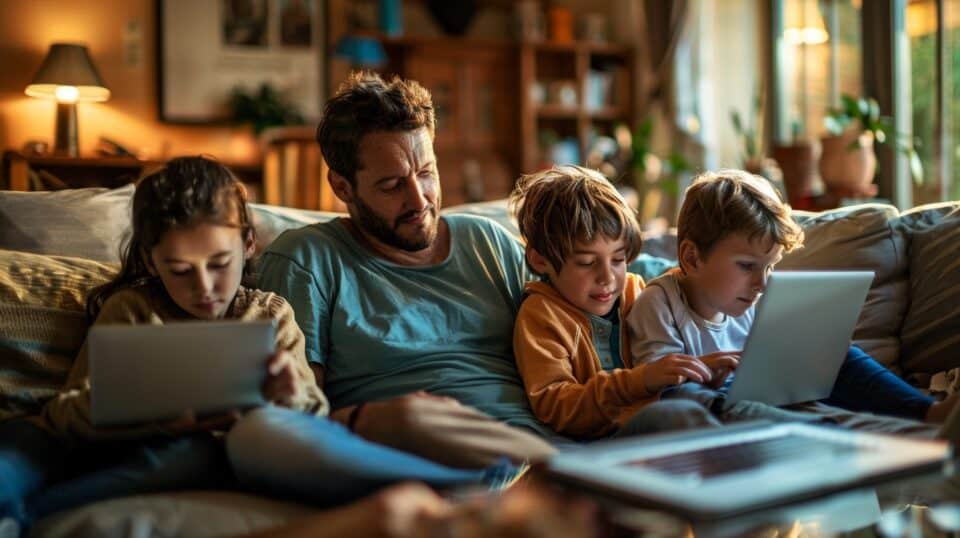
Picking the right VPN for your family can keep everyone safe online. According to the VPN experts at Geek Extreme, some VPNs let lots of devices connect at once, making them perfect for families.
Surfshark for Unlimited Device Connections
Surfshark stands out because it lets you connect as many devices as you want. This is great news for families. With a single subscription, everyone in your home can stay safe online on their smartphones, tablets, laptops, and even smart TVs.
Surfshark’s network includes over 3,200 servers in more than 100 countries. This means fast and reliable connections everywhere.
The cost of Surfshark is quite reasonable too—$11 per month or even less if you choose a longer plan like the $59.54 offer for two years. What really sets it apart is its low speed loss of only 17% during tests in 2023.
So, when my family streams movies or makes video calls, we hardly notice any difference in our internet speed.
With Surfshark, sharing with my family isn’t just possible; it’s simple and efficient.
NordVPN for Family Use
NordVPN stands out as the top choice for families in 2024, allowing up to 10 devices to connect at once. This means everyone in your house can enjoy their own internet activities safely.
From streaming videos on platforms like Disney+ and Prime Video to protecting your browsing on Google Chrome or Firefox, NordVPN covers it all. I’ve used it across various devices – smartphones, tablets, and even smart TVs – ensuring that everyone’s digital life is secure without slowing down our internet speed.
Its support for different operating systems is a big plus. Whether we are using Windows laptops, Android phones, or an Apple TV app, setting up was straightforward. The simultaneous connections mean my family stays protected whether they’re doing homework, watching movies, or shopping online.
Plus, NordVPN blocks annoying ads and shields us from harmful websites and cyber threats like viruses and hackers trying to invade our privacy.
ExpressVPN for Smooth Multi-Device Streaming
ExpressVPN shines for streaming on many devices. It allows eight connections at once. This means you and your family can watch different shows on various devices without trouble. ExpressVPN works well with Apple TV, but if you use Linux, prepare to use the command line.
Its network covers over 3,000 servers in 105 countries, making it easy to find a fast connection for watching videos. Plus, its Lightway protocol ensures quick speeds and secure connections.
If your family loves watching movies or shows online, ExpressVPN keeps everyone happy with smooth video playback and strong security across all devices.
CyberGhost’s Extensive Server Availability
CyberGhost stands out with its vast network of servers. It offers fast and stable connections, making it easy to access geo-blocked content like BBC iPlayer or Amazon Prime Video. Families can securely connect many devices, thanks to this wide-ranging server availability.
The VPN shines for family use with servers ready in countries all around the globe. This means you can enjoy video streaming on smart TVs, make secure Zoom calls, and prevent DDoS attacks no matter where you are.
CyberGhost ensures your online activities stay private while offering a smooth experience across various platforms – from Microsoft Edge on desktops to native apps on iOS or Android devices.
PureVPN: Connecting Up to 10 Devices Simultaneously
PureVPN stands out for families or anyone with lots of devices. It lets up to 10 devices connect at the same time. So, everyone in your house can use it on their phones, tablets, and computers without problems.
The servers are everywhere, making sure you get fast speeds and access to shows and websites from different places.
I’ve used PureVPN myself. My family could watch shows, play games online, and browse safely all at once. It was easy to set up on different gadgets too — Windows laptops, Apple phones, even our smart TV worked great with it.
With PureVPN’s strong privacy tools like AES 256-bit guard and kill switch features…you’re always safe.
Next up: Setting Up Your VPN for Family Use
Setting Up Your VPN for Family Use
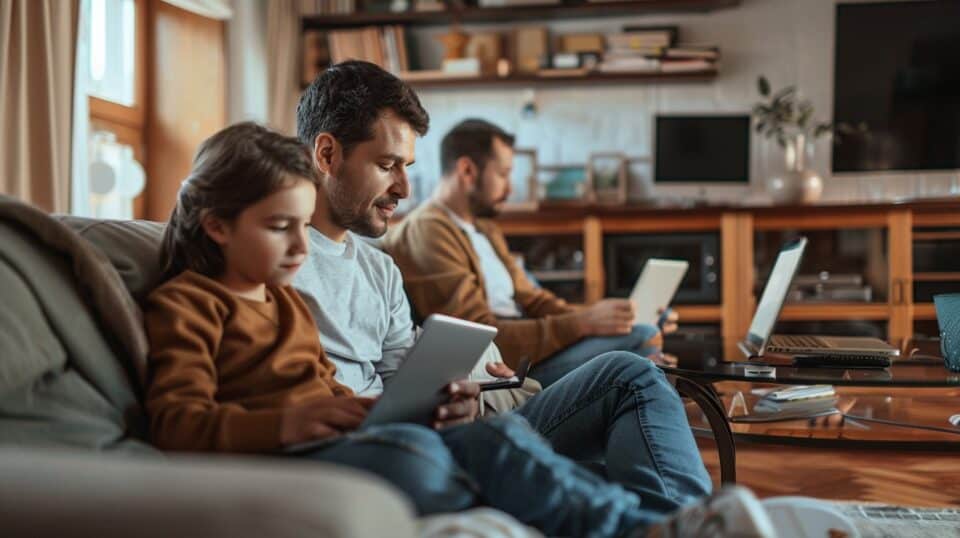
Setting up a VPN for your family is simple and brings peace of mind. Everyone can stay safe online across different devices. Here’s how to do it:
- Choose a VPN service that supports multiple connections. Look into options like Surfshark or NordVPN, which allow many devices on one account.
- Subscribe to your chosen VPN. This step involves picking a plan that fits your family’s needs and making a payment.
- Download the VPN app on each device. These could be smartphones, tablets, laptops, or even smart TVs with Google TV or WebOS.
- Log in to the app using your account details. You’ll need the email and password you set up during subscription.
- Connect to a server that suits your needs best. For example, if your family loves streaming, pick one that’s optimized for video content.
- Check for any special features you might want to use, like split tunneling or ad blocking. This lets some apps bypass the VPN or keeps annoying ads away.
- Test the speed once everything is connected, especially if multiple people are online at once. A good VPN won’t slow down your internet much.
- Teach everyone how to turn on the VPN and switch servers as needed. Easy accessibility is key for younger users or those not tech-savvy.
- Keep an eye out for updates from your VPN provider; new features might enhance your experience.
- Finally, explore additional settings like kill switches or dedicated IPs if you need them for work or more secure browsing.
I followed these steps when setting up our family’s VPN system, ensuring we all enjoy safe and open internet access without compromising speed or privacy—proof that with a little effort upfront, managing digital security for the whole household doesn’t have to be complex.
Top Free VPNs for Every Device
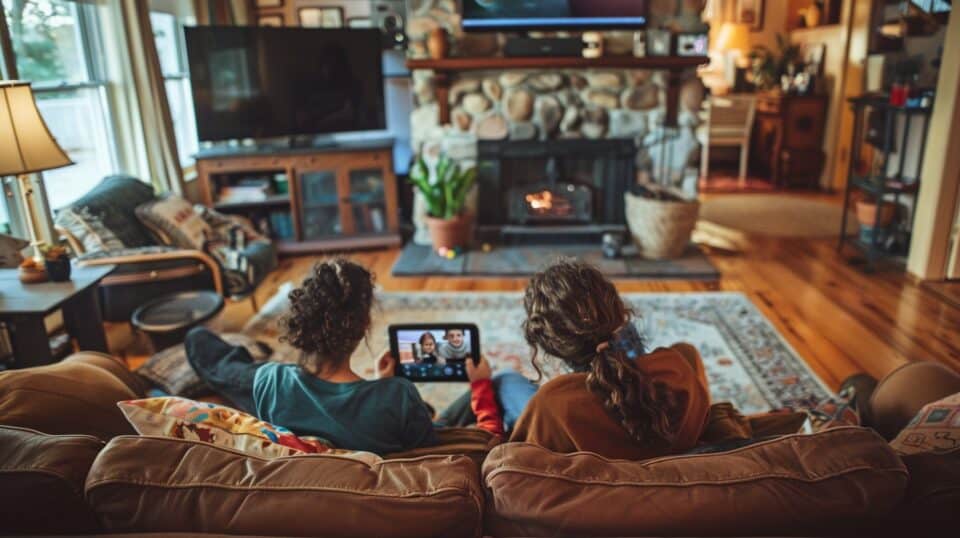
Everyone needs a solid VPN, but not all want to pay. Free VPNs can still offer good security for every gadget you own.
- Proton VPN stands out with speed and security on all major platforms. This one keeps no logs of internet activity, ensuring your online moves stay private. Even on the free tier, expect fast connections but remember it connects only one device at a time.
- Windscribe offers more than just privacy. With 10GB of data monthly for free users, you get enough for basic browsing and streaming. It works well on laptops, smartphones, and even smart TVs, making it versatile.
- TunnelBear is user-friendly with apps for most devices. You get 500MB of data per month — perfect for occasional use. Its strong encryption means your online tasks remain secure from prying eyes.
- Hotspot Shield provides quick setup and easy-to-use features across various devices, including Chromebooks and iOS gadgets in app stores. The free version has a daily limit of 500MB, which suits light browsing and email checking.
- Surfing the web without worrying about digital privacy becomes real with Vivaldi integrating ProtonVPN’s services directly in its browser for PCs and mobile phones — a unique feature that enhances protection while surfing.
Each of these free VPNs has proven dependable in my experience, offering a balance between security and ease-of-use without costing a dime. Whether you need to protect your laptop or keep your mobile browsing safe, there’s an option here that fits the bill perfectly.
FAQs About Sharing My VPN With Family
Can I share my VPN with my family?
Yes, you can! Most VPNs, like NordLynx and PrivateVPN, allow multiple devices on one account. Perfect for home networks… smart TVs included.
Will a VPN slow down our internet?
It might, slightly—due to encryption work. But, choosing a fast protocol like WireGuard helps keep things speedy, even when streaming or torrenting.
How does a VPN protect us?
By hiding your IP address and encrypting data… No more eavesdropping or cybercriminals peeking into your browsing history or online shopping.
Can we use the VPN on different types of devices?
Absolutely! From iOS apps to Smart TVs with Tizen OS—even IoT gadgets at home—all can connect through a secure tunnel.
What about ads and malware?
Most top-tier VPNs come with built-in ad blockers and malware protection… Say goodbye to annoying ads and hello to safer browsing on all web browsers.
Do we need extra security besides the VPN?
Yes—think two-factor authentication (2FA) for an added layer of safety against hacks; plus antivirus software wouldn’t hurt either.
